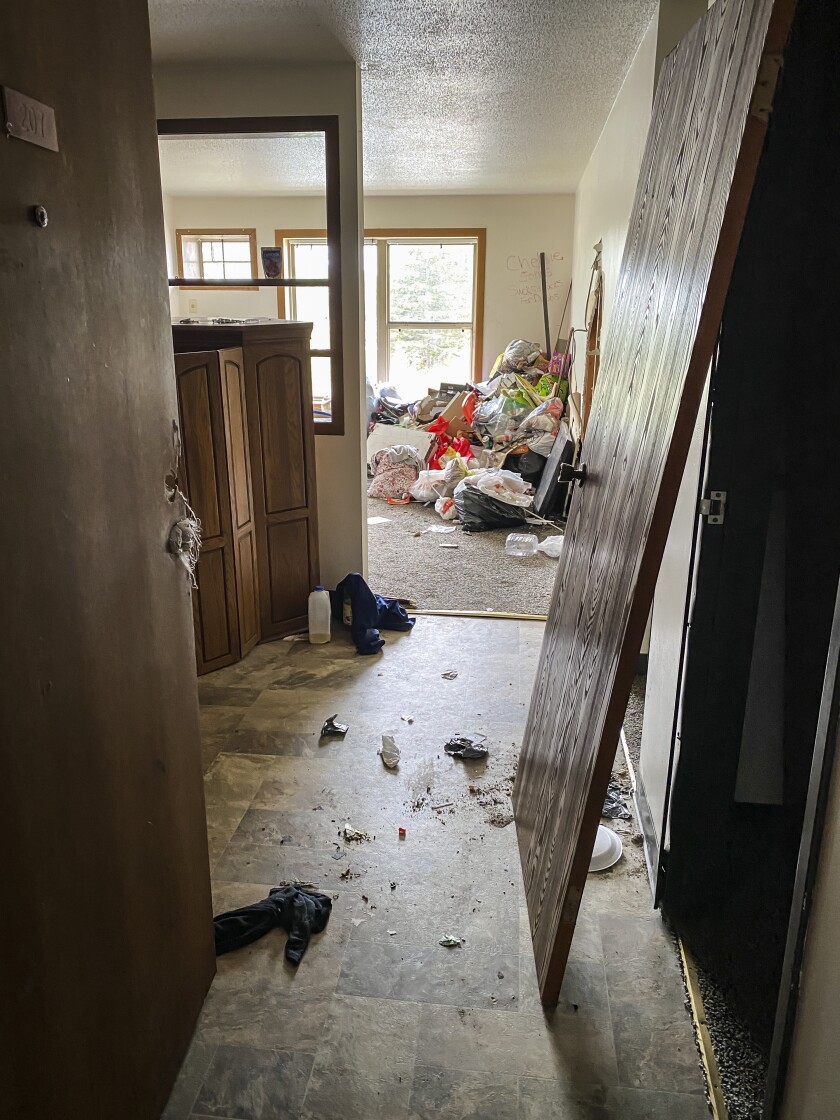BEMIDJI — Following two separate housing emergencies in the past year, the Bemidji City Council held a special work session on Tuesday to learn about potential solutions and changes that could improve the city’s emergency responses and ease the local housing crisis.
The discussion comes after several buildings in Ridgeway Courts I and II were condemned in 2022 over safety concerns, displacing several families after a lengthy period of uncertainty, and the more recent evacuation of the Red Pine Estates in early July that forced 47 residents to leave their homes in just six days due to structural issues with the building.
ADVERTISEMENT
Both of these incidents involved subsidized housing, which was a particular focus during Tuesday’s meeting, as well as what the city can do to prevent similar crises and improve its response should another situation occur.
“What are recommendations as a whole that can be made in regards to changes (that we) as a city, as a community, (can make) based on what we’ve seen both from Ridgeway and Red Pine,” posed City Attorney Katie Nolting at the start of the meeting. “What can the city do in regards to housing, specifically in regards to affordable housing.”
These were the questions city staff hoped to address in their presentation to the council, which began with sharing a plan for an after-action review of the response to Red Pine. This meeting will bring together city and county officials alongside community stakeholders to look at what can be done moving forward.
The rest of the meeting focused on strategies the city has to address three broad categories: changes to the rental ordinance to ensure tenant safety; how to encourage housing development within Bemidji; and how to improve emergency response plans.
Changing the rental code
Some of the first topics that were discussed were potential changes to the rental code, which was recently updated from a 2011 version in May.
These included the possibility of requiring a structural engineer’s report on larger rental buildings every 10 years, with the hope of catching issues in a building before they reach a point where safety is a concern and an evacuation is required.
“We’ve had lots and lots of discussions with all of this,” said City Rental Inspector Ben Hein. “We think there’s a possibility to alleviate problems, to figure out some problems beforehand (by) just looking over a property a little bit further.”
ADVERTISEMENT
Details on which buildings would require an inspection by a structural engineer would need to be worked out and owners would be able to hire the engineering firm of their choice.
The council responded favorably to this idea and noted that, if pursued, Bemidji would be one of the first cities to implement this requirement.
Another possible change to the rental ordinance could require landlords to provide temporary housing to tenants if they have to vacate their homes through no fault of their own.
This is in response to the 47 residents of Red Pine who were moved to hotels following their evacuation, and whose stays were funded through community donations.

Some parts of the state already require this based on statute, but the language of that particular law is interpreted differently in every county.
“A lot of judges in the state indicated (the statute says) landlords need to pay for temporary housing, (but) courts in Beltrami County have not taken that stance,” Nolting explained.
The city could take the decision into its own hands by writing the requirement into the rental ordinance, where the details and nuances of “through no fault of their own” could be decided.
ADVERTISEMENT
If a landlord failed to abide by this requirement or others in the rental code, the city would be able to take the issue to court and require that the landlord pay for the city’s legal fees.
“I think fundamentally what you want your rental ordinance to do is to provide safe housing for your renters,” said Mayor Jorge Prince. “You don’t want to penalize your good landlords, so you have corrective tools to be able to take action against those landlords who are not fulfilling their obligations.”
Economic development
To address the city’s lack of affordable housing, the council also discussed ways to encourage development. These included changes to planning and zoning ordinances and actions the council could take as the Bemidji Economic Development Authority.
Incentives for developers include the possibility of fee forgiveness for costs like connecting to city services and tax abatement for building affordable housing.
With construction costs and interest rates rising, Prince shared he believes supporting developers and reducing their costs is an integral part of increasing Bemidji’s housing stock.
“It might require more government aid, more municipal assistance than anytime before to develop affordable housing,” Prince said.
The city could also take a more direct approach to housing through the BEDA, which has the authority to develop, rehabilitate and construct housing, both single-family homes and multi-unit residences.
ADVERTISEMENT
“This is huge because all of our affordable housing is from the 70s and it’s been well used,” Nolting said. “To be able to rehabilitate it and keep it is going to be a fantastic thing.”
Once constructed or refurbished, these buildings could be sold below market value or if they’re rental units they could be passed over to the Bemidji Housing and Redevelopment Authority for management.
To fund these efforts, the BEDA also has the authority to levy taxes, with a maximum set at 1.813%. If the body were to levy the maximum amount in 2024, it could bring in $340,000 to support housing projects.
Other funding sources for the city to address housing also exist, such as the expected $113,627 the city will receive from the state in 2024 and again in 2025. Beltrami County will be receiving $131,410 in housing funds for both years.
Emergency response
One of the difficulties with the Red Pine Estates was how the evacuation was handled, part of which was a result of it being defined as a mass care incident rather than a disaster or emergency.
Because of the difference in definition, certain funds and agencies weren’t available to assist and the city lacked clear guidelines on how to respond.
To address this, Fire Chief Justin Sherwood discussed how Bemidji can improve its emergency preparedness and create response plans for situations like mass care incidents that don’t fit into larger categories.
ADVERTISEMENT
“(This is an opportunity) to look at our emergency management in the city. It’s a very antiquated program, we’re talking about the late 80s, so this is an opportunity to update that,” Sherwood said.
Sherwood explained that the city can work on pre-planning emergencies, particularly for buildings that are at a higher risk due to age, location or material. The pre-planning would include a consideration of the demographics of the residents and what their needs would be if they had to be evacuated.
“We want to be proactive instead of reactive,” Sherwood said.
Another way to improve the city’s response is to create a Community Emergency Response Team, which would be made up of volunteers and a manager who would assist in any crisis situation.
CERT training would be provided and could be funded by the Federal Emergency Management Agency.
As the meeting drew to a close, councilors expressed their gratitude to city staff and the community for their work.
“I want to acknowledge the reason why we’re even having this meeting, and thank the volunteers and folks who showed up to help Red Pine residents,” said Ward 1 Councilor Gwenia Fiskevold Gould.
ADVERTISEMENT
At-Large Councilor Audrey Thayer also expressed her gratitude but added a level of frustration that the city and community hadn’t pushed for a similar meeting after Ridgeway last year.

“This was our second mass care incident, we didn’t even pay attention to our first,” Thayer said. “I’ll always be befuddled as to what happened that we didn’t get that support for the people at Ridgeway.”
The recommendation given to the council was to schedule another meeting to follow up on these items once the after-action review on Red Pine has taken place, which the council agreed to do.
“When something happens in our community, no matter how well we think we responded, we have an obligation to learn, to do better,” Prince said. “That’s the fundamental thing.”










